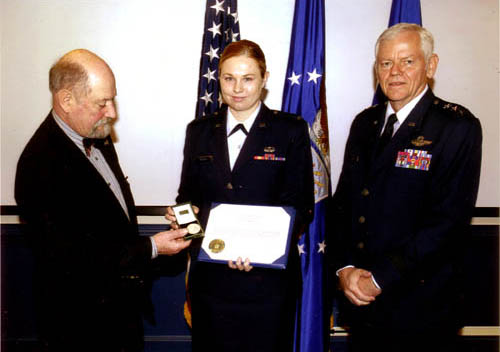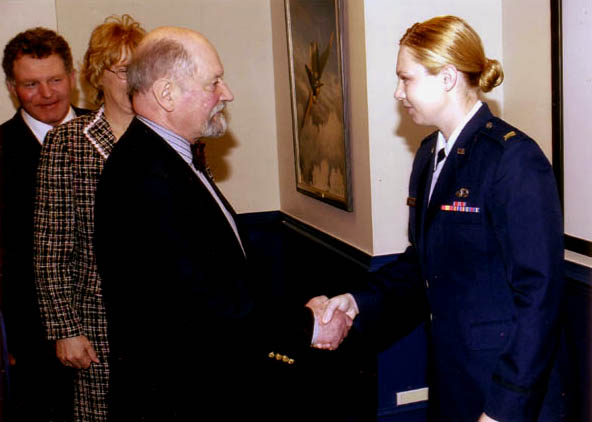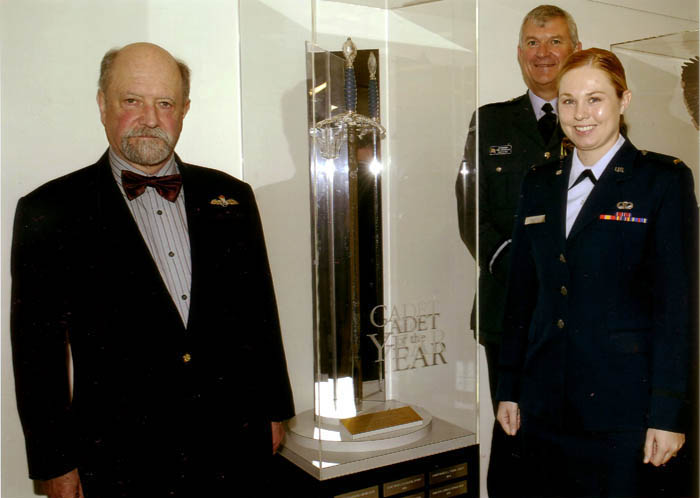|
 SOPnewswire
SOPnewswire
The
Cadet of the Year 2005 Award Ceremony
Lord
Revelstoke’s speech on
behalf of The Air Squadron
Press
Releases - Posted April 20, 2006     
General Lichte, Lt. Palatas, Distinguished Guests,
Ladies and Gentlemen.
We don't expect people to blow their own trumpet, so it's
up to us to blow it for them when they do an outstanding job.
The award we are to present here will go to a winner, but the standard
to
achieve is set by all those young people who join the Air Force as
cadets and strive to reach a high standard. So, as we hold this
ceremony to honour the winner, it honours all who have taken part.
In the military, as in other careers and businesses, we work as teams
and
as part of a wider community. Teamwork, as we approached the end of the
last millennium, is what has brought a well-established fantasy to
reality. It is no coincidence that Clarke Kent stepped into a phone
booth to reappear as Superman. Although as youngsters we may have
dreamed of
individuals with super-powers, we now understand that Superman is many
people working together, with good communications. The phone booth has
become the Internet, with computers, fibre optics and satellite
communications bringing a new level of human collective capability.
When Neil Armstrong put his boot on the moon, it was the
finger of the nation that touched it. The team spirit works at many
levels. The whole of society is involved. Unless the
people collecting the waste in our cities do their job, we
cannot do anything on a sustainable basis. Nevertheless, every team
depends on
the excellence of individual performance to achieve its
objectives.
The Air Squadron was founded in England in 1966 as a society of friends
who
believed that aviation, both military and civil, should be fostered as
a discipline and a career to attract and encourage all those who look
forward to developing a global society with high hopes and high
standards. We presented a Trophy for the best Royal Air Force cadet
unit and later a memorial sword for the best individual cadet in memory
of Squadron member Air Chief Marshall Sir John Thomson.
In the year 2000 we celebrated the dawn of the new century and almost
100 years of allied Anglo-American aviation
The
Millennium Sword, to commemorate the Cadet of the Year Award, comes
from America's friends and the home of just some of its many founding
fathers and mothers, so it bears witness to an even wider family.
I myself have 10 American great great grandparents out of 16, and two
others who, though domiciled in the UK, were deeply involved in
creating the United States and Canada.
Our global family today is independent of such relationships.
It transcends race, religion, and colour and knows one basic principle:
handsome is as handsome does. Although we are empowered by the
technology I referred to, it is on the integrity of human beings that
the future of humanity depends.
An aviator has to be
aware of his or her environment. This awareness of the possibilities
and probabilities, continually updated, is the secret of survival and
success. In military aviation you have additional dimensions. Beyond
the challenges of time and distance and foul weather there may be not
only a target, but an enemy. There are missions of mercy, search and
rescue, disaster relief, research and development and space - the final
frontier, but you may also be called upon to mount a devastating and
lethal assault and put yourself in harm's way in the delivery of
it.
You need to have faith in the chain of command, knowing that those who
give
the orders are men and women who have been trained in this art of
awareness that is at the heart of the business of flying, of being in
charge of an aeroplane, of air traffic control, of the weather
situation and the forecast.
Our diplomats work for peace so
that conflict can be avoided, and we have come to understand that
certain weapons held as deterrents cannot be used as weapons of
manageable war or interdiction. Globalization has further changed the
situation. The days of territorial conquest are truly gone, but a
consequence is that all nations must subscribe to a minimum common
agenda, which is one of openness and of abiding by the international
agreements they sign up to. Only in this way can we prevent the
technology of the 21st century from affording devastating power to
individuals who are not accountable or subject to checks and
balances.
The
defence of freedom can appear complicated and paradoxical at times. As
members of the world's largest military establishment you will be
called upon for help by nations all over the world and, after you have
responded at great cost and risk of life and limb, the next thing that
happens is you will be asked to leave as soon as possible. You will
also probably be told that the original problem was entirely your
fault, if not personally then collectively or by proxy, and if not now
then 50 or 100 years ago.
That's par for the course. You can cheer yourself and retain sanity by
realising they are probably right,
but the only way to avoid making mistakes is to do nothing, and it is
only by trial and error that we proceed. However it is good to bear in
mind the motto of Esther Dyson: "Always make new mistakes".
It is possible, we know from history, for nations in times of perceived
threat to be vulnerable to internal tyranny. It is even possible to
democratically elect a dictatorship. Nations have done this. The
problem is it may be their last real election for a long time. History
has also taught us that if an external threat to any nation is
perceived as coming from us in the free world, we can be the cause of
our own misfortune. So while our armed forces must prepare for the
worst, we must reach out as civilians to the citizens of the oppressed
nations so they feel able to have confidence in the global community
and its political and military leaders.
Now let me turn to the
winner of this year's Cadet of the Year Award whose citation we shall
presently hear. I was delighted to see that she graduated with a B.S.
in Meteorology and Climatology. Met is the only subject in which I ever
got 100% in an exam. It is a vital part of aviation knowledge even in
these days of all-weather capability and robot aircraft. As for
Climatology, it is the science that preoccupies the world now and its
mastery is a priority.
Another occupation of mine since the
start of the Millennium has been the promotion amongst young people of
physical and mental health through nutrition and exercise, so here
again I am happy to see the winner has more than a passing interest in
keeping in good condition and encouraging others to do the same.
Finally,
I am impressed that as in some previous years it is a young lady who
has taken the award, giving the men a tough challenge. The Millennium
Sword is there to remind us of the previous winners as the years pass,
but today belongs to Lt. Janelle Palatas.
Thank you very much.
|
|





